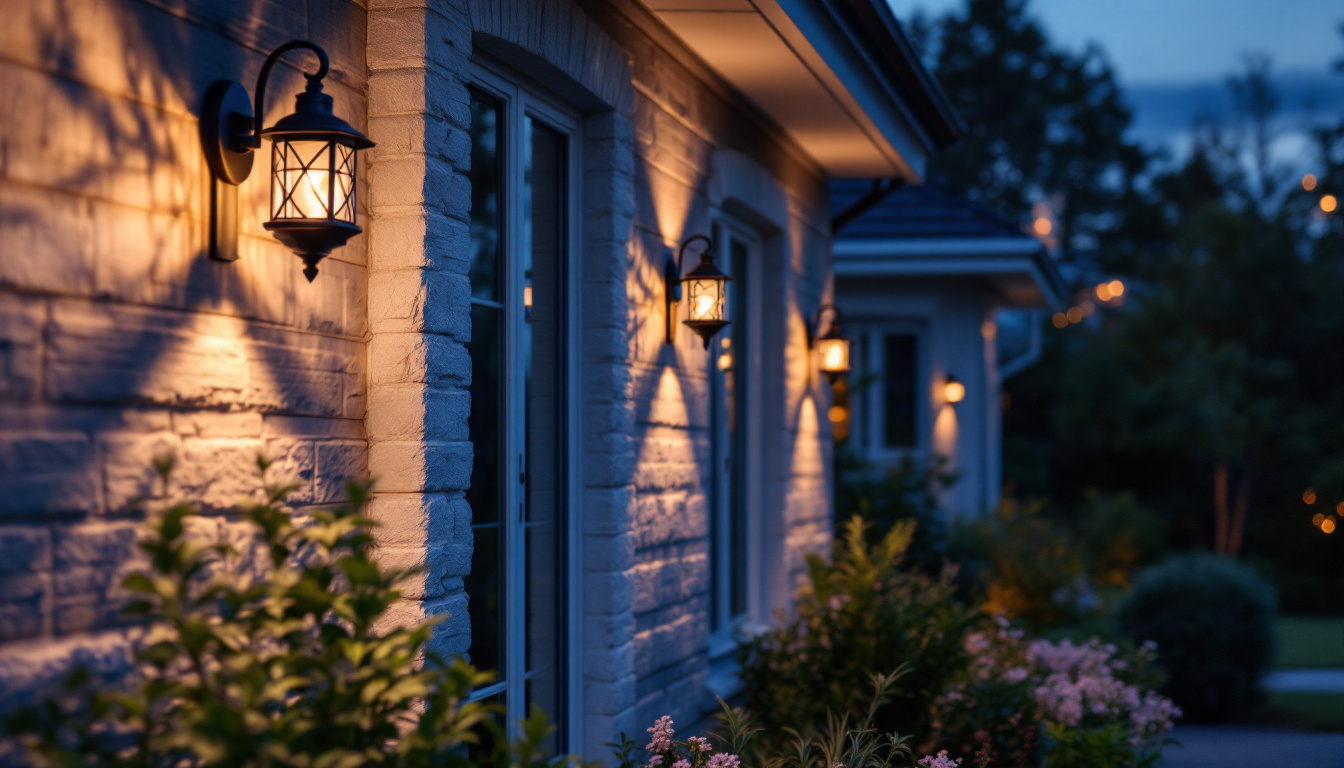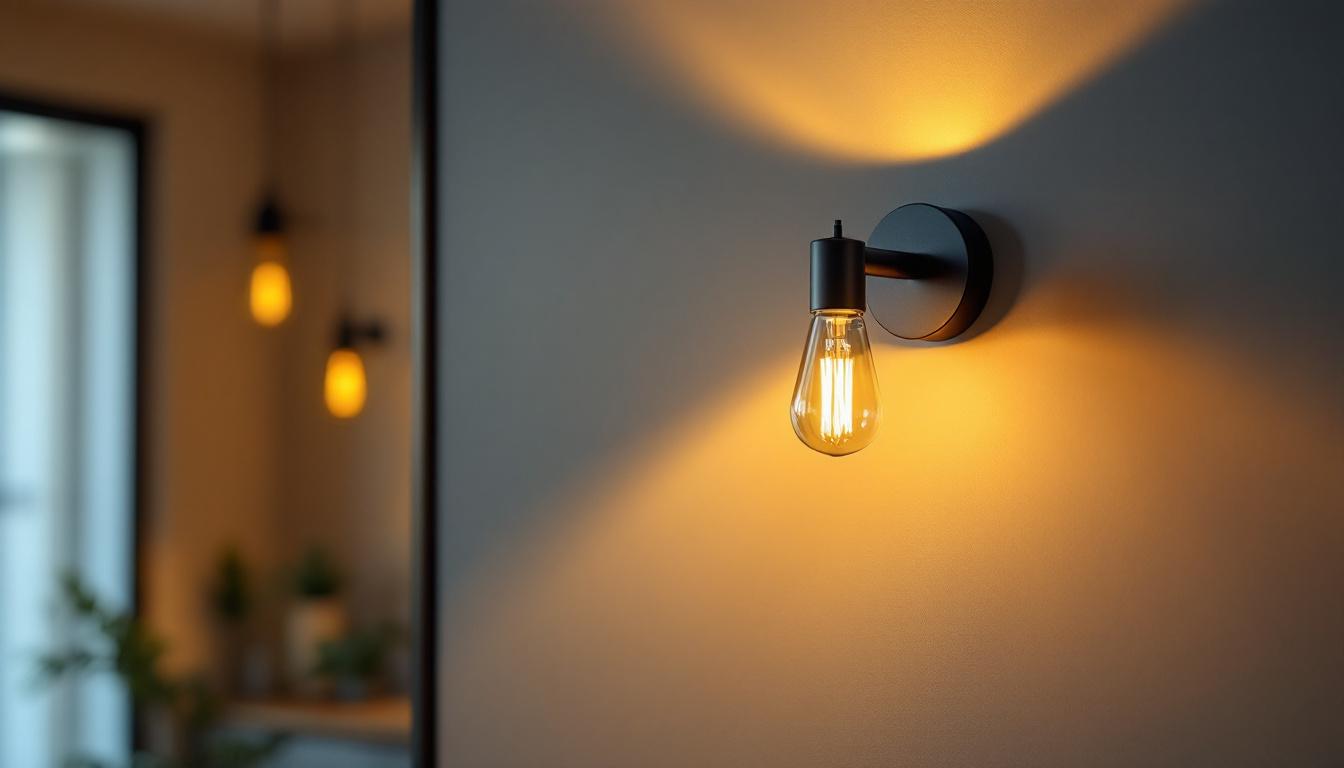
In recent years, solar outdoor sconce lights have gained popularity among homeowners and businesses alike. These eco-friendly lighting solutions not only enhance the aesthetic appeal of outdoor spaces but also offer energy efficiency and cost savings. For lighting contractors, understanding the nuances of solar sconce lights is crucial for recommending the right products to clients. This guide will explore the key factors to consider when selecting solar outdoor sconce lights, ensuring that contractors can provide informed recommendations.
One of the primary advantages of solar outdoor sconce lights is their ability to harness renewable energy from the sun, making them an environmentally friendly choice. Unlike traditional lighting options that rely on electricity, solar sconces operate independently, reducing the carbon footprint of outdoor lighting. Additionally, advancements in solar technology have led to improved battery life and light output, allowing these fixtures to illuminate spaces effectively even on cloudy days. Homeowners can enjoy the peace of mind that comes with knowing their outdoor lighting is sustainable and cost-effective, as they will not incur high electricity bills associated with conventional lighting systems.
Moreover, the versatility of solar outdoor sconce lights is another significant factor contributing to their appeal. Available in various designs, styles, and finishes, these fixtures can complement any architectural theme or landscaping design. From sleek modern designs to more traditional lantern styles, there is a solar sconce to suit every taste. Furthermore, many models come equipped with motion sensors or adjustable brightness settings, allowing homeowners to customize their outdoor lighting experience. This adaptability not only enhances security by illuminating pathways and entryways but also creates inviting atmospheres for outdoor gatherings, making solar sconces a practical and stylish choice for any outdoor space.
Before delving into the specifics of solar outdoor sconce lights, it is essential to grasp the basic principles of solar technology. Solar lights operate by converting sunlight into electricity, which is stored in batteries for later use. This process involves several components, each playing a vital role in the overall functionality of the lighting system. The efficiency of solar technology has improved significantly over the years, making it a viable option for both residential and commercial applications. As society becomes increasingly aware of the need for sustainable energy solutions, solar technology continues to evolve, offering innovative designs and enhanced performance.
Typically, solar outdoor sconce lights consist of a solar panel, battery, LED bulb, and a light fixture. The solar panel collects sunlight during the day, converting it into electrical energy. This energy charges the battery, which powers the LED bulb at night. The efficiency of each component directly affects the performance and longevity of the solar light. Additionally, many modern solar lights come equipped with sensors that detect ambient light levels, allowing them to automatically turn on at dusk and off at dawn. This feature not only conserves energy but also extends the lifespan of the battery, ensuring that your outdoor spaces are illuminated only when needed.
There are primarily two types of solar panels used in outdoor lighting: monocrystalline and polycrystalline. Monocrystalline panels are known for their high efficiency and compact size, making them ideal for areas with limited sunlight exposure. On the other hand, polycrystalline panels are generally more affordable but may require more space and sunlight to operate effectively. In addition to these, there are also thin-film solar panels, which are lightweight and flexible, allowing for versatile installation options. While they may not be as efficient as their crystalline counterparts, their adaptability makes them a popular choice for unique applications, such as curved surfaces or portable lighting solutions.
Selecting the right solar outdoor sconce lights involves several considerations that can impact both functionality and aesthetics. Lighting contractors should evaluate the following factors to ensure optimal choices for their clients.
The brightness of solar outdoor sconce lights is measured in lumens. For outdoor applications, a range of 100 to 300 lumens is typically recommended, depending on the intended use. For instance, pathway lighting may require lower lumens, while areas needing security or accent lighting may benefit from higher outputs. Understanding the specific needs of the space will guide contractors in selecting the appropriate brightness level.
The battery capacity of solar lights is crucial for determining how long they will operate after sunset. A higher capacity battery will store more energy, allowing the light to function for extended periods, even on cloudy days. Contractors should look for products with batteries that can last for at least 8-12 hours on a full charge to ensure reliable performance throughout the night.
Outdoor lighting fixtures are exposed to various weather conditions, making durability a significant factor. Contractors should recommend solar sconces made from weather-resistant materials, such as stainless steel or high-quality plastic. Additionally, products with a good IP rating (Ingress Protection) will provide better resistance against dust and moisture, ensuring longevity and performance.
The design of solar outdoor sconce lights plays a vital role in enhancing the overall look of outdoor spaces. Lighting contractors should consider the architectural style of the property and the preferences of the homeowner when selecting fixtures.
Solar sconces come in various styles, including modern, traditional, and rustic designs. Each style can complement different architectural features, so it is essential to consider the overall theme of the property. Additionally, finishes such as bronze, black, or white can help integrate the lighting fixtures seamlessly into the environment.
Color temperature is another critical aspect to consider. Solar outdoor sconces typically emit light in warm white (2700K to 3000K) or cool white (4000K to 5000K) tones. Warm white light creates a cozy and inviting atmosphere, while cool white light offers a more modern and vibrant feel. The choice between these options should align with the intended ambiance of the outdoor space.
One of the advantages of solar outdoor sconce lights is their ease of installation. Unlike traditional wired lighting systems, solar sconces do not require extensive electrical work, making them a cost-effective option for many homeowners. However, contractors should still be aware of best practices for installation and maintenance.
When installing solar sconces, it is essential to place them in areas that receive ample sunlight throughout the day. Ideally, the solar panel should be positioned to avoid shade from trees, buildings, or other obstacles. Additionally, contractors should ensure that the fixtures are securely mounted and at a height that maximizes visibility while minimizing the risk of damage.
While solar outdoor sconces require minimal maintenance, regular cleaning of the solar panels is necessary to ensure optimal performance. Dust, dirt, and debris can accumulate on the panels, reducing their efficiency. Contractors should advise clients to periodically wipe the panels with a soft cloth to maintain their functionality. Additionally, checking and replacing batteries as needed will help prolong the life of the fixtures.
In addition to their aesthetic appeal and cost savings, solar outdoor sconce lights offer significant environmental benefits. Lighting contractors can highlight these advantages to clients who are environmentally conscious or looking to reduce their carbon footprint.
Solar lighting systems operate entirely on renewable energy, reducing reliance on fossil fuels and lowering greenhouse gas emissions. By choosing solar outdoor sconces, homeowners contribute to a more sustainable future while enjoying the benefits of energy-efficient lighting.
Solar sconces can also help minimize light pollution, especially when designed with appropriate shielding and directionality. By focusing light where it is needed and reducing glare, these fixtures can create a more pleasant nighttime environment for both residents and wildlife.
While the initial investment in solar outdoor sconce lights may be higher than traditional lighting options, the long-term savings can be substantial. Lighting contractors should help clients understand the cost implications of their choices.
The upfront costs of solar sconces include the price of the fixtures and any necessary installation materials. However, since these lights do not require electricity, homeowners can save significantly on energy bills over time. Additionally, the reduced maintenance costs associated with solar lights further enhance their appeal.
Contractors can assist clients in calculating the return on investment (ROI) for solar outdoor sconces. By considering factors such as energy savings, reduced maintenance costs, and potential increases in property value, homeowners can make informed decisions about their lighting investments.
Choosing the right solar outdoor sconce lights involves a careful evaluation of various factors, including brightness, battery capacity, design, and environmental benefits. Lighting contractors play a crucial role in guiding clients through the selection process, ensuring that they choose fixtures that meet their specific needs and preferences. By understanding the technology, installation requirements, and cost implications, contractors can provide valuable insights that lead to successful lighting projects.
As the demand for sustainable and energy-efficient lighting solutions continues to grow, solar outdoor sconce lights will remain an essential option for contractors looking to enhance outdoor spaces. By staying informed about the latest trends and technologies in solar lighting, contractors can position themselves as trusted advisors in the industry, ultimately leading to satisfied clients and successful projects.
Ready to elevate your outdoor lighting projects with the best solar sconce lights on the market? Look no further than LumenWholesale, where we provide contractors with superior, spec-grade lighting solutions at unbeatable wholesale prices. Our extensive selection is designed to meet the highest industry standards, ensuring you deliver reliable and high-performance lighting to every client. Plus, with free shipping on bulk purchases, you can secure premium lighting at the best value — all without hidden fees or compromises. Make the smart choice for your business and explore our wholesale lighting options today to find the perfect fit for your next project.

Explore how black wall lights can enhance energy efficiency in your home.

Discover expert tips and techniques for lighting contractors to master the installation and design of cylinder wall sconces.

Unlock the secrets of warehouse lighting with our comprehensive guide tailored for lighting contractors.

Explore the transformation of ceiling light fixtures with a focus on flush mount designs.